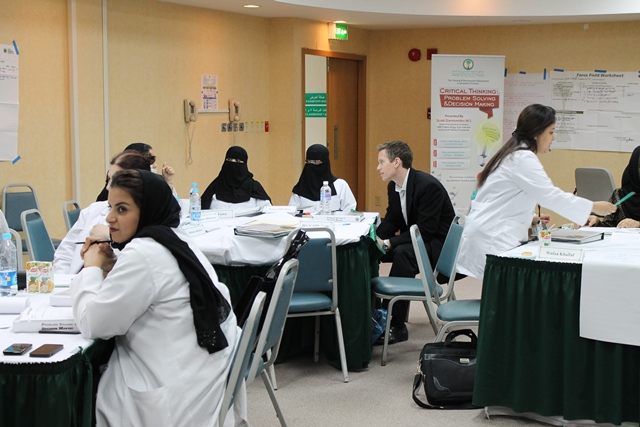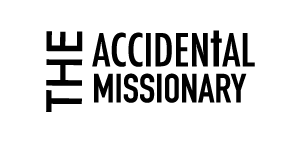Week Eleven: "A Long Strange Trip"
/I went to Riyadh, Saudi Arabia to teach a class this week. No. That’s not a lie.
I was doing work with the King Faisal Specialist Hospital and Research Center. They had conducted a web search and stumbled across some information about a Critical Thinking workshop I teach. They invited. I accepted.
 *A group of hospital leaders working through a critical decision
*A group of hospital leaders working through a critical decision
To say Riyadh is conservative is an understatement. Outside the Embassy walls, there are no movie theaters, bars, or dance clubs. There’s no alcohol to be found. The flight attendants on the plane took it away from everyone once we crossed into Saudi airspace. Women and men are not allowed to accompany one another in public, unless married. There is almost no crime. The customs admission form includes a graphic of a skull and crossbones declaring drug traffickers will be subject to the death penalty.
I kept my allergy medicine in the hotel just in case.
Most everything that a typical westerner might call “fun” has been wiped from the community like a muddy footprint, save for one thing. Shopping malls. While retail represents 7.9% of the entire Gross Domestic Product in the US, in Saudi Arabia, it’s 17%. You can’t throw a kabob without hitting a Bath & Body Works. I’m stereotyping here, but Saudis visit the mall so much it’s as if the entire country was made up of 13-year-old suburban girls jonesing for a fro-yo. I wondered how such constant exposure to commercialism might impact the culture here, causing there to be an imbalanced focus on acquiring stuff.
Wanting to experience it for myself, I went to the mall on my first night there. The place was filled with window shoppers. Women out for a girl’s night. Families with kids in strollers. Guys hanging out and chatting. I noticed some familiar stores such as Victoria’s Secret, which seemed quite out of place to my untrained eye. But you quickly realize that the long, black abaya worn in public by every adult woman is simply covering up clothing that fashionable ladies are sporting the world over. Public and private lives are very different in Saudi Arabia.
* Methinks Victoria has lots of secrets underneath that black robe
Around six o’ clock, I was getting hungry when I heard an unfamiliar sound. It was the Muslim call to prayer being broadcast over the mall loudspeaker. Storefronts closed. Most men disappeared. Women gathered in close-knit groups. Seeing that it would be another 20 minutes before I could go to McDonald’s for my McArabic (an actual menu item), I took a break.
I wandered over to a bench and pulled out my two-day-old USA Today. I made it through the first paragraph of an article skewering the latest Steve Carrell movie when I got the unsettling sensation I was being watched. I turned around to see a rather large mall security guard standing behind me.
“You cannot sit here.”
I quickly panicked, as I often do when surprised. My mind drifted to the skull and crossbones as I wondered if reading a colorful newspaper was against Saudi law.
“Oh. I’m sorry.”
“Go to Starbucks.” The man was intimidating, speaking in broken English.
“Starbucks?”
“Let me show you.”
He walked me to the elevator, pressed the button, and escorted me into the elevator. We spent an uncomfortable half minute riding to the second floor, neither of us making a sound. When the doors opened, he curtly gestured toward the Starbucks which was also shuttered during prayer.
“Go there.”
I did as I was told. I sheepishly walked to the coffee shop and stood there like a frightened puppy, afraid to even glance at my newspaper. Is Starbucks just a holding pen for unruly Americans? Others were walking around and window shopping. But I stood still. I didn’t want to see the guard again.
After fifteen minutes of people watching, the storefronts opened, and I took that as my cue to move. International incident averted.
The next day in class, Latifah, a housing manager approached me during a break.
“How are you enjoying your trip?”
“Very much,” I replied.
“It’s very different from the U.S., no?”
“Yes it is.” Her face was covered by her head scarf, but I could see the smile in her eyes.
 *chatting it up with participants
*chatting it up with participants
“Can I ask you a question, Latifah?”
“You just did.”
Good one. We both laughed.
“I was in the mall last night during the evening prayer. I sat down on a bench to read my newspaper, but a security guard quickly approached and ushered me off to Starbucks. Is it illegal to read during prayer time?”
She paused, then laughed out loud.
“No, Mr. Scott.” she responded, still smiling at the worry on my face. “As a form of respect toward women, it is customary to leave them a place to sit. Especially during prayer time.”
The only law I had broken was being a jerk. Like the guy who steals a subway seat from your grandmother. The security guard was just trying to salvage what little chivalrous honor I had left.
 * A good shot of the classroom. Falah is in the back with the white head scarf.
* A good shot of the classroom. Falah is in the back with the white head scarf.
Falah, a fellow student and the hospital’s media relations rep, caught the end of our conversation. He was wearing his keffiyeh, a long robe and with a white head scarf. He asked,
“What is the perception of Saudis in the United States?”
Haifa, a research lab technician, interrupted him.
“He’s not going to tell you!”
Before he could respond, I answered.
“Sure! I’ll tell you. Many people in the United States are fearful of anything in the Middle East outside of Dubai. Very few people would want to travel here willingly. They think it might be dangerous. My mother, for example, called me just before I got on the plane to say her ‘final goodbye’. I think it’s a product of what they see on TV. Bombings. Terrorist groups.”
Someone else, I forget whether it was Latifah or Haifa said, “My family was scared for me to go to New York. Very dangerous. People get shot all the time. According to the TV programs.”
Apparently CNN and Law & Order don’t do anyone any favors. Media manipulation distorting reality.
Falah continued, “Mr. Scott. You seem like a really good guy. Are you interested in falconry?”
“Falconry?” This may be one of the most obscure questions I’ve ever been asked.
“Yes. Hunting with falcons. I have written nine books on falconry, and run a falconry club here. If you come back, I would love to take you out to the desert with my bird. We could hunt. See some camels. It would allow you to see an entirely different side of the country.”
Haifa added, “We actually have hunting camels, too. They snatch birds right out of the air.”
My eyes were wide until I realized she was pulling my leg. Showing how quickly reality can get distorted. She smiled. Falah handed me a copy of one of his books, and his personal contact information.
“I’m not kidding. I would love to take you out.”
“I will call you. Most definitely.”
Later that evening, I took one final trip to the mall before my midnight flight. I was laughing at myself. My misconceptions. The night before, I remembered wondering how such constant exposure to commercialism might impact the culture here, causing there to be an imbalanced focus on acquiring stuff. Heck, even on this second trip to the mall, I found myself wanting to break the Year Without A Purchase vow. I’m half way around the world! I gotta’ bring some shiny junk back for the kids, right? How can anyone stay connected to what’s important when you’re surrounded by the unimportant all the time.
As I was about to walk into a leather goods store and browse the luggage, I heard the sound again. Over the loud speaker came an atonal voice singing the adhan – the call to prayer.
Storefronts closed. Most men disappeared. Women gathered in close-knit groups. For the next twenty minutes, people left their everyday distractions behind and re-centered on God. Me included. I put away the newspaper and focused on what’s important.
For three minutes, anyway.
But there was nothing else to do. And here, it happens five times per day.
Before sunrise. Fajr. Remembering God.
At noon. Dhuhr. Asking for guidance in your day.
Late afternoon. ‘Asr. In the midst of daily stress. Pausing to remember God’s greater meaning in our lives.
Before sundown. Maghrib. Thankfulness for a day well-lived.
After sundown. ‘Isha. Remembering God’s presence, mercy and forgiveness.
How beautiful. How consistent. Connecting with God as part of a routine. Like bathing or breathing. Simple and powerful.
I went to Riyadh, Saudi Arabia to teach a class this week.
But learned far more than I taught.
*the gang's all here! Me and my new friends.


